Kayar – a childhood caught in the nets
 Documentary, directed by Thomas Grand, ZIDEOPROD 2009, 52 min. Sound track Wolof with French sub-titles. Produced with the support of the Spanish International Development Cooperation (AECID)
Documentary, directed by Thomas Grand, ZIDEOPROD 2009, 52 min. Sound track Wolof with French sub-titles. Produced with the support of the Spanish International Development Cooperation (AECID)
Review by Thomas Zadrozny
With "Kayar – a childhood caught in the nets", based on the life of artisanal fishermen in the third artisanal fishing port in Senegal, the French filmmaker Thomas Grand offers a fascinating as well as oppressive portrait of the drama of this lively fishing town. Kayar is situated 60 km north of the capital Dakar, next to a marine cañon, which provided habitat to many different marine species, many of which are valuable commercially. It also has rich farming ground for vegetable production thanks to available freshwater. Indeed, the name Kayar itself reflects these two sources of livelihood: it is between the sea and the land. Families from Saint Louis, Yoff and Rufisque were the principal settlers and have given Kayar its specific character. In 2002, town status was conferred to Kayar.
As fishing was very lucrative for a long time, gardening has been neglected. But over the last 10 years a creeping crisis in the fisheries has spelled increasing hardship for Kayar. The causes can be sought in overfishing and the consequently diminishing resources. In turn the overexploitation, is driven by relentless expansion of all types of fishing, human demography, policies encouraging technological modernisation but failing to regulate access to resources effectively, the absence of no-take periods during reproduction times of key species and incursions of bottom trawlers, which destroy the habitats on the seafloor. This has reduced the diversity of exploitable species.
Click here to see the beginning of the film on the mundus maris channel.
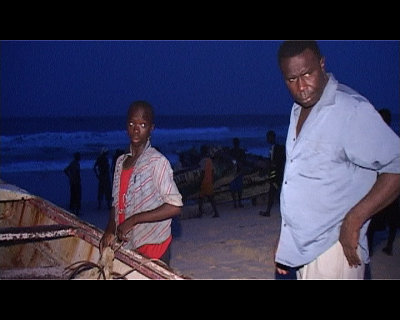 The film describes the life and prospects of Adama, a boy turned fisherman. This film is only too real, showing hard evidence of the underlying causes and consequences of the mass exodus of young fishermen to Europe.
The film describes the life and prospects of Adama, a boy turned fisherman. This film is only too real, showing hard evidence of the underlying causes and consequences of the mass exodus of young fishermen to Europe.
Exciting, visually beautiful, very mystical and yet both, practice-oriented and constantly philosophical, "Kayar – a childhood caught in the nets" raises certainly in the admirers of the film the beginning of their commitment to solving the social problems presented.
Thomas Grand makes us reflect, through the fate of a child confronted with the tradition of artisanal fisheries and the new doors that may be opened by school enrollment, the myriad problems many fishing villages now live through.
Issues such as access to education, health, vocational training, issues of parental responsibility, retraining and alternatives to fishing, are presented in a simple but real, clear and accurate manner and all that with the magical, but not at all picturesque, effect of life in Africa.
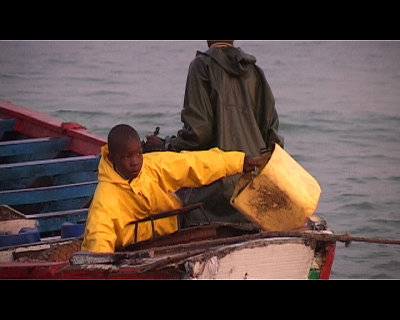 This is the great success of the film: daring, reproducing in full the realities, depicting the complicated issues and hope - all these elements are masterfully blended around the life of a boy full of life and hope.
This is the great success of the film: daring, reproducing in full the realities, depicting the complicated issues and hope - all these elements are masterfully blended around the life of a boy full of life and hope.
By following the daily life of Adama, the film takes us along through several chapters of life in Kayar.
We see how men in the very height of their career, are tired of the hard life as fishermen, therefore send their children to do the work for them and bring home the increasingly modest gains of this work.
An important moment of the film is when one compares this to the choice of going to school in a village with only a very limited school enrollment capacity, which is the cause of having barely other alternatives outside of fishing for boys and postharvest activities for girls.
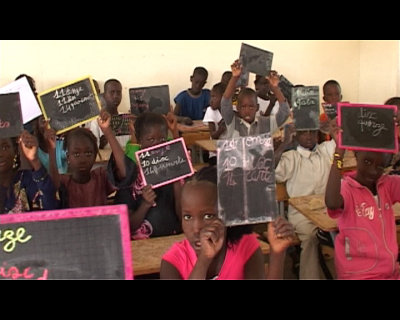 Kayar does not have a nursery school and a very limited capacity in primary school.
Kayar does not have a nursery school and a very limited capacity in primary school.
The film shows this harsh reality, where many children must return home after failing to find a place.
However, the efforts of the teaching team to tackle this problem are quite original since they organised two rotating parallel classes with the same resources.
With regard to secondary education, only some 500 young people can be accommodated at the College mid-level education (CEM) of Kayar.
Young people wanting to go forward with their education are then forced to make very long trips with chaotic public transport to get to Thies, the nearest town with a high school. Not to mention the almost insurmountable challenge to access higher education.
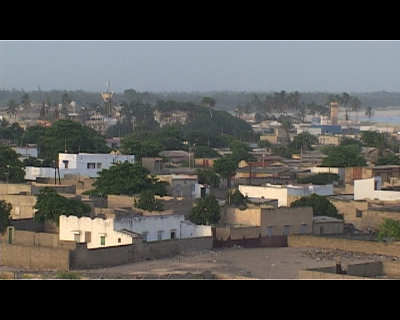 The film also presents the drama of illegal emigration, the result of young people not seeing a future for themselves in the region.
The film also presents the drama of illegal emigration, the result of young people not seeing a future for themselves in the region.
Those left behind face those who have had a chance to settle in Europe and invest their money in the construction of new buildings.
Broken dreams for those who remain compared to the chance of the migrants, however, a chance that hides the real tragedy of all those killed in the dangerous crossing leaving behind their impoverished families.
Finally Adama's life leads us to the raw reality of public health services in Kayar, which simply can not provide even basic services.
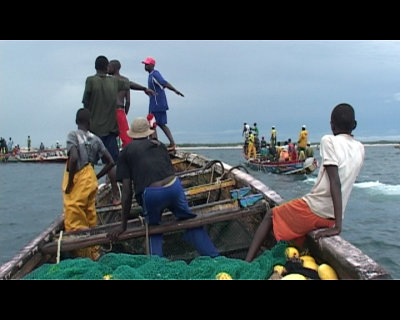 The result are high rates of infant and maternal mortality.
The result are high rates of infant and maternal mortality.
This whole issue brings the people of Kayar to reflect on their situation and to formulate possible solutions regarding their needs for education and public health, but also the need to change their attitudes to avoid falling into the traps of simplicity.
We can already see some results of that questioning in the film itself in the form of increased access of women to education and greater transparency about their social role.
Another sign that the film showed lines of action: Since early 2011 there is at least one pharmacy, but the hospital is still awaited.
“Kayar”, which intends to tell through the village life issues and consequences of globalisation, provides a representative picture of the lives and perspectives of different generations literally “caught in the net”.
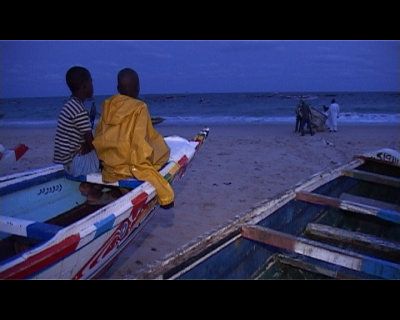 At the same time, this documentary shows and proposes "local" actions that have great potential to reverse these problems adding value to the lives of the villagers and creating opportunities for local (sustainable) development.
At the same time, this documentary shows and proposes "local" actions that have great potential to reverse these problems adding value to the lives of the villagers and creating opportunities for local (sustainable) development.
This is the third documentary film by Thomas Grand. By chosing the music of Seckou Keita as sound track, this French - Lebou filmmaker succeeds with creativity and high quality photography to produce a tool of social communication and media for the development of the town of Kayar. The film is based on an extensive research of about three years, which allowed precise targeting of awareness about the challenges and preparing the emergence of new initiatives to address these critical issues experienced in Kayar.
The film "Kayar, a childhood caught in the nets" was selected in the competition at the second film festival "Fishers of the world" in Lorient in March 2010. The festival selects films about fishermen and fish workers. The jury was composed of equal numbers of film professionals and the fishing industry. Another jury brings together young high school students of maritime schools and from general education. Click here for the festival site.
For an interview with the film director, read on.








